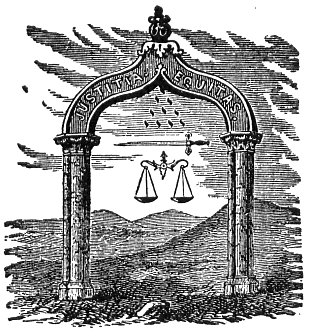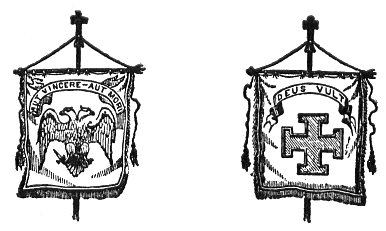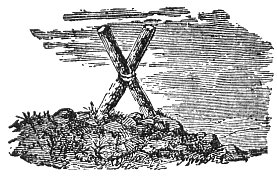p. 578
THIS is the first of the really Chivalric Degrees of the Ancient and Accepted Scottish Rite. It occupies this place in the Calendar of the Degrees between the 26th and the last of the Philosophical Degrees, in order, by breaking the continuity of these, to relieve what might otherwise become wearisome; and also to remind you that, while engaged with the speculations and abstractions of philosophy and creeds, the Mason is also to continue engaged in the active duties of this great warfare of life. He is not only a Moralist and Philosopher, but a Soldier, the Successor of those Knights of the Middle Age, who, while they wore the Cross, also wielded the Sword, and were the Soldiers of Honor, Loyalty, and Duty.
Times change, and circumstances; but Virtue and Duty remain the same. The Evils to be warred against but take another shape, and are developed in a different form.
There is the same need now of truth and loyalty as in the days of Frederic Barbarossa.
The characters, religious and military, attention to the sick and wounded in the Hospital, and war against the Infidel in the field, are no longer blended; but the same duties, to be performed in another shape, continue to exist and to environ us all.
The innocent virgin is no longer at the mercy of the brutal Baron or licentious man-at-arms; but purity and innocence still need protectors.
War is no longer the apparently natural State of Society; and for most men it is an empty obligation to assume, that they will not recede before the enemy; but the same high duty and obligation still rest upon all men.
Truth, in act, profession, and opinion, is rarer now than in the days of chivalry. Falsehood has become a current coin, and circulates with a certain degree of respectability; because it has an actual value. It is indeed the great Vice of the Age–it, and its twin-sister, Dishonesty. Men, for political preferment, profess
p. 579
whatever principles are expedient and profitable. At the bar, in the pulpit, and in the halls of legislation, men argue against their own convictions, and, with what they term logic, prove to the satisfaction of others that which they do not themselves believe, Insincerity and duplicity are valuable to their possessors, like estates in stocks, that yield a certain revenue: and it is no longer the truth of an opinion or a principle, but the net profit that may be realized from it, which is the measure of its value.
The Press is the great sower of falsehood. To slander a political antagonist, to misrepresent all that he says, and, if that be impossible, to invent for him what he does not say; to put in circulation whatever baseless calumnies against him are necessary to defeat him,–these are habits so common as to have ceased to excite notice or comment, much less surprise or disgust.
There was a time when a Knight would die rather than utter a lie, or break his Knightly word. The Knight Commander of the Temple revives the old Knightly spirit; and devotes himself to the old Knightly worship of Truth. No profession of an opinion not his own, for expediency’s sake or profit, Or through fear of the world’s disfavor; no slander of even an enemy; no coloring or perversion of the sayings or acts of other men; no insincere speech and argument for any purpose, or under any pretext, must soil his fair escutcheon. Out of the Chapter, as well as in it, he must speak the Truth, and all the Truth, no more and no less; or else speak not at all.
To purity and innocence everywhere, the Knight Commander owes protection, as of old; against bold violence, or those, more guilty than murderers, who by art and treachery seek to slay the soul; and against that want and destitution that drive too many to sell their honor and innocence for food.
In no age of, the world has man had better opportunity than now to display those lofty virtues and that noble heroism that so distinguished the three great military and religious Orders, in their youth, before they became corrupt and vitiated by prosperity and power.

Moe is the founder of GnosticWarrior.com. He is a father, husband, author, martial arts black belt, and an expert in Gnosticism, the occult, and esotericism.







